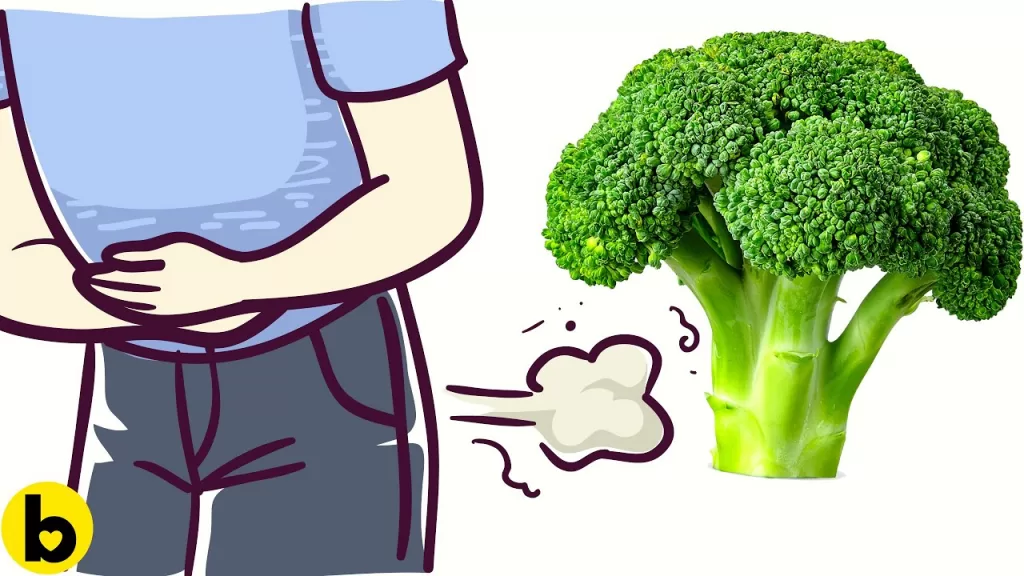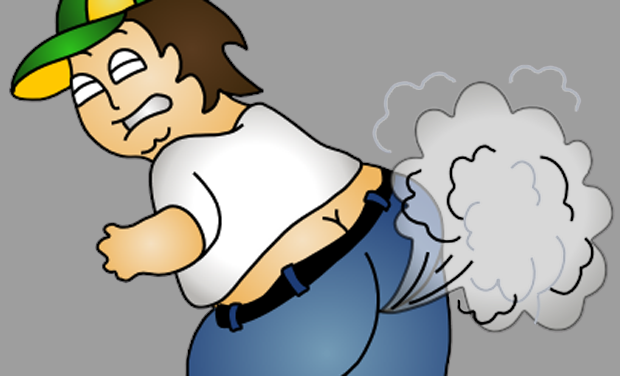Did you know that the average person farts between five and fifteen times a day? In case you didn’t know, farting is quite normal, and for some people, the average frequency might be as high as 18 times a day. As a bonus, gas doesn’t usually have an unpleasant smell. Yet there are times when your gas is positively stale.
That gas you’ve been letting off has a purpose, even if it doesn’t smell great. One example is the “silent-but-deadly ones” or “the extremely smelly dudes.” But bad smells could be signs of bigger health problems that need to be checked out by a doctor.
Natural digestive processes result in the release of a variety of gases, such as hydrogen, hydrogen sulfide, carbon dioxide, ammonia, and methane, as a byproduct of the bacterial fermentation of digested food. Most of it is odor-free and invisible, though.
Why the development of Smelly Gas
When you don’t have regular motion or poop in the morning, gas builds up in your lower gut. When all of these combined gases pass through their system, they may occasionally emit a foul odor.
Thus, the occasional bout of nasty flatulence is to be expected, but the chronic passing of foul gas may indicate a health problem. It can be embarrassing to have to deal with passing gas, especially if it’s really unpleasant. Those who have to deal with gas that has an unpleasant odor might take some measures to alleviate the issue.
Gas in the intestines is a normal and even healthy part of the digestive process. The typical human will belch several times per day. It’s not unusual for a fart to have a strong odor or to have no odor at all. Both are regarded as typical in society.
Here are some possible reasons for your stinky farts, from what you eat to an infection, and some ways to fix them.

1. Diet
The most prevalent cause of unpleasant flatulence is a poor diet or poor eating habits. Eating too rapidly might cause you to inhale air along with your meal, which can lead to bloating and gas. David Prologo, MD, an obesity expert, and author, says that this could lead to unpleasant flatulence.
Farts can become more offensive after eating certain foods. Fiber-rich foods, such as beans, vegetables, and fruits, are at the top of the list. Odorous farts can be caused by the release of hydrogen, carbon dioxide, and methane gases, which are produced when bacteria in the gut digest fiber.
Onion, broccoli, and cabbage are all high-sulfur foods that can trigger unpleasant flatulence. Sulfur compounds in these foods are broken down when the body digests them, which makes a gas that smells like rotten eggs.
What you should do is eat slowly and chew your meal fully; this will help your digestive system process it better. Soaking the beans for a full night prior to eating them softens them considerably. Record what you eat to figure out what triggers bloating and gas.
There’s no need to avoid these items because of health concerns, but you might want to avoid them before going out. If stinky gas is a problem, “moderate consumption may help reduce the number of stinky gas episodes.”Damage to the digestive tract is one of the symptoms of celiac disease, an autoimmune disorder. Celiac disease makes it difficult for sufferers to digest wheat products because they contain gluten.
The following are some other symptoms a person with celiac disease could encounter, for example, weight loss, bloating, diarrhea, and exhaustion.
If you or a loved one suspect that you have a food allergy or intolerance, it’s important to get tested. It will help find the harmful thing in food and figure out where the problem is coming from.
2. Food allergies
Many people have food sensitivities because their bodies have trouble digesting certain meals. Lactose intolerance is the most common kind of food allergy or intolerance. It happens when the body doesn’t make enough of the enzyme needed to digest lactose, the sugar in milk, and other dairy products.
This may make the farting worse because bacteria in the gut break down the undigested lactose and produce gas.
The same mechanism that causes gas in people with gluten sensitivity can also cause gas in people with FODMAP intolerance.
Food intolerance symptoms can include, but are not limited to, the following:
- Pain in the abdomen soon after eating
- Diarrhea
- Rash or itchiness on the skin
The way forward: If you suspect a food allergy, you should be checked out. Keeping a food diary may help you determine which foods are aggravating your symptoms so you can avoid them. Finally, see your medical professional about the use of digestive aids, such as lactase pills, which provide the enzymes your body needs to process milk.
3. Stool hardness
Most of what comes out of a person’s digestive tract is an indigestible fiber. When feces sit in the colon for more than 36 hours, bacteria keep digesting the fiber and producing gas. Flatulence may be more offensive after eating fiber-rich foods like broccoli.
The digestive system has a hard time processing high-fiber diets. Even though these slow-digesting foods are good for health and wellness, they break down or ferment in the digestive tract. A foul odor is released during fermentation.
4. High-fiber foods
High-fiber foods tend to have a more pungent aroma. A person’s flatulence may be offensively odoriferous if they regularly eat certain things.
Among the list of potentially pungent foods are:
- Cabbage
- Asparagus
- Broccoli
- Garlic
Foods that are high in fiber tend to be higher in sulfur as well. Because sulfur has a strong stench, this can alter the chemical composition of a person’s farts, making them smellier.
Unfortunately, unpleasant flatulence does not indicate forward progress. It’s merely an indicator that the gas is seeking the path of least resistance.
The way forward: Get to the bottom of what’s making your bowels feel sluggish. Make sure you’re getting the recommended daily amount of fiber, which is 25 grams for women and 38 grams for men. Get lots of exercise and water in your diet. using a laxative if you are still not having at least three bowel motions each week.
5. Use of medicines
There are a lot of drugs and dietary supplements that can slow or speed up digestion, which can cause smelly farts for which solely the medication could be at fault.
Many pharmaceuticals and dietary aids can slow or speed up the digestion process, perhaps leading to gassy farts. The additives and sugar alcohols in some of the others, Moday warns, make them hard to digest.
Some medications can produce excessive gas production, such as:
- OTC pain medications that contain nonsteroidal anti-inflammatory drugs (NSAIDs) such as ibuprofen and acetaminophen include Motrin® and Advil®.
- Antacids
- Anti-diarrheal meds
- Meals that are high in fiber are healthier.
- Opiate analgesics
- Antidepressants
The way forward: Have a discussion with your medical provider about changing the dosage, discontinuing the drug, or lowering the frequency of your doses. However, no medicine should be changed without first consulting a doctor.
You should talk to your doctor if gas is affecting your daily life, even if it seems like a minor side effect.
Your doctor may recommend making adjustments to your medicine and also making changes to your lifestyle, such as boosting your fiber and water intake, to aid in digestion.

6. A preexisting desease
It can be challenging to determine the root cause of really unpleasant flatulence. If you’ve been having smelly gas but haven’t made any big changes to your diet or medicines, you should see a doctor.
“Foul-smelling gas can also be a sign of an infection in the intestines or a digestive disease,” says Waghray.
Among the many possible causes of flatulence are:
- Syndrome de l’intestin irritable (IBS)
- Inflammatory bowel diseases include Crohn’s disease and ulcerative colitis, to name only two examples of the condition (IBD).
- Cancer of the colon
- Problems with dumping
- Internal hemorrhaging
- Caused by polyps in the colon
The way forward is to schedule some time with your doctor. If dietary modifications don’t improve your health, Prologo advises seeing a doctor or primary care specialist who can rule out more serious issues.
In order to make a diagnosis and choose the best course of therapy, your doctor will ask about any additional symptoms you may be experiencing.
7. Constipation
When the big intestine or colon becomes blocked, the result is constipation. Possible biological factors include taking certain drugs, eating poorly, or both.
Stool accumulation in the colon frequently coincides with the accumulation of noxious gases. It’s possible that the extra gas will make you feel bloated and uncomfortable. When the gas is finally let out, it has a bad odor. Constipation is a common cause of gas or gas symptoms. The most basic definition of constipation is the inability to pass stools regularly. For example, if feces are taking an unusually long time to leave the colon, this could be the case.
Constipation is caused by feces “hanging in your colon for too long, and then bacteria may really go to town and generate loads of gas.” And when that happens, it can get rather pungent.
that eating high-fiber foods, drinking enough water, and exercising regularly can all help prevent constipation. Here are a few examples of high-fiber foods:
- Fruits
- Seeds and Nuts Without Salt
- Vegetables
- Complete grains
8. Infections and lots of bacteria
Nutrients from food are metabolized in the digestive system and absorbed into circulation. In addition, it generates waste that must be eliminated by the colon.
In this way, the digestive tract depends on a number of things, including the good bacteria that are already there.
If the normal balance of bacteria in the gut is upset, an infection can happen. Smelly diarrhea, copious flatulence, and abdominal pain are common symptoms of the infection.
- Diarrhea
- Fever
- Nausea
- Vomiting
- Fatigue
Those who suffer from any of these signs should see a doctor without delay.
The collection of bacteria, fungi, and viruses found in the gut is called the gut microbiome. These microorganisms aid digestion by metabolizing carbohydrates. The by-product of this procedure could be gas.
Sulfur-containing chemicals, such as hydrogen sulfide, are produced by gut bacteria during digestion and contribute to the unpleasant odor of digestive gas.
Some folks have a unique kind of flora inside of them that makes it so they produce more gas or gas that smells worse.
9. Cancer of the colon
Colon cancer is not as frequent as other types of cancer, but it can cause unpleasant gas symptoms. Gas accumulation in the intestine may be caused by an obstruction in the bowel caused by cancerous polyps or tumors.
Even after making changes to your diet or medical care, if you still have gas that smells bad, this is an early warning sign.
An average-risk individual should get screened for colon cancer after turning 50.
Dietary changes may be suggested as a means of treating excessive flatulence.
One might often try home remedies for flatulence. Changes in nutrition are often effective in reducing or eliminating gassiness. Because of these changes, you may need to eat less of some foods or stop eating them altogether. When it comes to limiting or eliminating certain foods, the specifics will depend on the individual.
Another possibility is that a person’s medication is causing bad flatulence. Stopping the use of an OTC drug is usually all that’s needed to feel better.
It’s also recommended to visit a doctor if:
- Extra symptoms crop up for them
- Neither dietary nor pharmacological adjustments have resulted in any noticeable improvement.
There may be an underlying medical issue causing the excessive burping in these circumstances. The doctor can do tests to determine the root cause of the gas and prescribe the best course of action.
Prevention
For those whose digestive issues are triggered by what they eat, dietary changes are often the first line of defense.
Some people find that keeping a food diary helps them identify patterns in when they eat and when they have episodes of particularly offensive farts. Once they identify the offending item or foods, they can cut back on them or eliminate them entirely.
Here are several ways to control gas production:
- Reducing one’s serving size
- Keeping away from items that may cause an allergic reaction
- Choosing foods that don’t have an unpleasant odor
- Consuming food slowly and upping water intake
- Keeping away from carbonated beverages, which include yogurt and other probiotic foods
It’s possible that the real problem is more serious than just a little digestive upset or little constipation. In these cases, gas production can usually be stopped by treating the underlying illness.
Even if you’re eating loads of healthy, fiber-rich, sulfurous foods, you could start to smell a little funky. For the most part, “the benefits of those foods greatly surpass the discomfort of flatulence,
You can learn what’s making your farts smell bad by keeping a food diary. It’s important to discuss any issues you’re having with your doctor, whether they’re related to your body (like bloating) or your social life (like passing gas). However, unpleasant farts often only last a short time and aren’t anything to worry about.
Flatulence is usually not a sign of illness because it is a natural occurrence.

Last line:
Smelly farts are completely OK; in fact, they’re encouraged. An individual’s diet might increase or decrease the frequency and intensity of farts. The first thing you should do to stop embarrassing flatulence is to look at what you eat and revisit your morning activity of motion clearance.
Disclaimer: The author’s views are his or her own. The facts and opinions in the article have been taken from various articles and political commentaries available in the online media and Eastside Writers does not take any responsibility or obligation for them.
Note: Contact our Writers at www.eastsidewriters.com for writing Blogs/Articles on any niche. We have experts in various domains from Technology to Finance and from Spirituality to Lifestyle and Entertainment.






